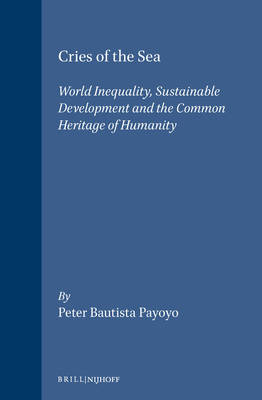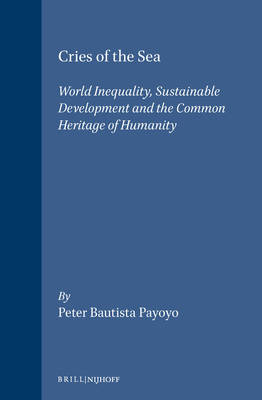
- Afhalen na 1 uur in een winkel met voorraad
- Gratis thuislevering in België vanaf € 30
- Ruim aanbod met 7 miljoen producten
- Afhalen na 1 uur in een winkel met voorraad
- Gratis thuislevering in België vanaf € 30
- Ruim aanbod met 7 miljoen producten
Zoeken
Cries of the Sea
World Inequality, Sustainable Development and the Common Heritage of Humanity
Peter Bautista Payoyo
€ 547,95
+ 1095 punten
Omschrijving
A treasure lies at the bottom of the oceans. This treasure takes the form of a legal and ethical principle which may illuminate the potential for an enriching international community in a world of growing disparities. It is the principle of the Common Heritage of Humanity.
The 1982 United Nations Convention on Law of the Sea delineated an Area and then proclaimed the Area and its resources `the common heritage of mankind'. The author suggests that the terms `common', `heritage', and `humanity' invite a larger perspective on the law underlying the Convention.
Cries of the Sea provides a unique view of `the deep blue sea' through the lens of the politics of international ocean law and policy and in particular through the exposition of the Common Heritage of Humanity as a fundamental principle of international law. The book explains why - and how - the Common Heritage principle constitutes an indispensable ingredient in any global programme for sustainable development. Legal philosophers and practitioners alike, in the ocean arena and beyond, will find that this work offers an intriguing intellectual and moral challenge.
This book received the first Arvid Pardo Prize for outstanding scholarship on the Law of the Sea.
The 1982 United Nations Convention on Law of the Sea delineated an Area and then proclaimed the Area and its resources `the common heritage of mankind'. The author suggests that the terms `common', `heritage', and `humanity' invite a larger perspective on the law underlying the Convention.
Cries of the Sea provides a unique view of `the deep blue sea' through the lens of the politics of international ocean law and policy and in particular through the exposition of the Common Heritage of Humanity as a fundamental principle of international law. The book explains why - and how - the Common Heritage principle constitutes an indispensable ingredient in any global programme for sustainable development. Legal philosophers and practitioners alike, in the ocean arena and beyond, will find that this work offers an intriguing intellectual and moral challenge.
This book received the first Arvid Pardo Prize for outstanding scholarship on the Law of the Sea.
Specificaties
Betrokkenen
- Auteur(s):
- Uitgeverij:
Inhoud
- Aantal bladzijden:
- 568
- Taal:
- Engels
- Reeks:
- Reeksnummer:
- nr. 33
Eigenschappen
- Productcode (EAN):
- 9789041105042
- Verschijningsdatum:
- 1/10/1997
- Uitvoering:
- Hardcover
- Formaat:
- Genaaid
- Afmetingen:
- 155 mm x 235 mm
- Gewicht:
- 992 g

Alleen bij Standaard Boekhandel
+ 1095 punten op je klantenkaart van Standaard Boekhandel
Beoordelingen
We publiceren alleen reviews die voldoen aan de voorwaarden voor reviews. Bekijk onze voorwaarden voor reviews.








